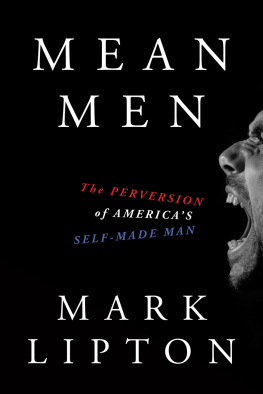Guide
Table of Contents
Praise for Mean Men
Mark Liptons unsettling masterpiece makes a compelling case for why, all too often, mean men get ahead in business and politics. He shows why their unhealthy nastiness and selfishness is too often confused with healthy competence and drive. He documents the damage they do and, thank goodness, shows that leaders dont need to be mean to get aheadhow some of our best (such as Mark Zuckerberg) have matured into caring and giving people and how such wisdom has helped them build great and civilized organizations. Robert Sutton, professor of management at Stanford University and author of The No Asshole Rule and The Asshole Survival Guide
Mean Men is a book whose time has come. More than ever, in this Trumpian age, its important to decipher the darker side of leadership. Mark Lipton provides a penetrating analysis of what can go wrong in the leadership equation. He helps us understand why Lord Actons statement that Power tends to corrupt, and absolute power corrupts absolutely is even more relevant in this day and age. Manfred F. R. Kets de Vries, distinguished clinical professor of leadership development and organizational change at INSEAD, France, and author of Riding the Leadership Rollercoaster; Leaders, Fools and Imposters; The Neurotic Organization; Unstableat the Top; and Prisoners of Leadership
Like a kid afraid to see what was in the dark basement but compelled to do so, I kept creeping into Mark Liptons incredible world of Mean Men. What I found was spellbinding and intellectually vital. What I left with is renewed hope that all of us can be leaders who can make the world better, day by day. This is an enduring volume. Sydney Finkelstein, Steven Roth professor of management and director of the Tuck Leadership Center at the Tuck School of Business, Dartmouth College, and author of Superbosses: How Exceptional Leaders Master the Flow of Talent and Why Smart Executives Fail
Whats worse than an asshole, or the worst sort of asshole? The guy who is abusively mean. Mark Liptons engaging book gets into the head of mean men, why our entrepreneurial culture is spawning them, and how we might get back to true leadership and civil cooperation. Aaron James, professor of philosophy at the University of California, Irvine, and author of Assholes: A Theory and Assholes: A Theory of Donald Trump
ALSO BY MARK LIPTON
Guiding Growth: How Vision Keeps Companies on Course
Copyright 2017 Mark Lipton
All rights reserved.
No part of this book may be reproduced, or stored in a retrieval system, or transmitted in any form or by any means, electronic, mechanical, photocopying, recording, or otherwise, without express written permission of the publisher.
Names and identifying details of some people and companies portrayed in this book have been changed, and some people are composites.
Published by Voussoir Press, New York
www.marklipton.com

Edited and Designed by Girl Friday Productions
www.girlfridayproductions.com
Editorial: Leslie Miller and Nicole Burns-Ascue
Interior Design: Paul Barrett
Cover Design: Anna Curtis
Image Credits: Cover image kpatyhka/Shutterstock; Author photo: Val Allard
ISBN (Hardcover): 978-0-9986130-1-7
ISBN (Paperback): 978-0-9986130-0-0
e-ISBN: 978-0-9986130-2-4
First Edition
To Valerie, who inspires me every day
CONTENTS
PROLOGUE
Nobody likes being fired. But when Zynga laid off over five hundred employees in the spring of 2013, its a good bet that some of those let go by the social game-maker were happy to move on.
Zyngas CEO, Mark Pincus, was not a fun guy to work for.
Pincus became a billionaire during the minibubble for overhyped social media companies in 2010 and 2011. But by 2013, he was fighting to keep his company afloat. And for those who knew him well, there was a poetic justice to his fall.
Mark Pincus was mean.
Pincus, a serial entrepreneur with a Harvard MBA, led Zynga to financial success in the early years with social media game apps like FarmVille that leveraged Facebooks social network to grow an ever- expanding subscriber base. While Wall Street sung the praises of Zyngas unique business model, both Pincus and Zynga were raked over the coals by the trade press. Innovative, yesbut Pincus and Zynga were using these first-generation social gaming apps alongside predatory lead generation tactics to manipulate their users into unknowingly signing up for subscriptions. Pincus exposed his growing estrangement from ethics in his 2009 speech at the Y Combinator Startup School in Berkeley where he admitted doing every horrible thing in the book to just get revenue right away.
Pincus made no apologies for his behavior. Taking a cocky stance in interviews, he noted proudly the multiple times his belligerent attitude got him fired from previous jobs. Internal reports from Zyngas current On the outside, there seemed to be no limit to Zyngas growing power to not only steal more effectively from competitors and manipulate its users, but also leverage the law to its advantage. They had cash, and cash talked.
Meanwhile, inside the company, Zynga had established its reputation as a meat grinder for employees. Their mission? Make a profit. Even before the mass layoffs, a steady stream of high-profile talent was leaving. One former employee called it the worst possible work environment and culture imaginable... CEO says stuff like, When you come to the conversation understanding that Im always right youll have a better outcome.
Zyngas downward spiral at the hands of an unethical, arrogant, and abusive leader shows why these particular men are a real and growing problem: these guys dont just make life miserable for those around themthey damage or destroy entire companies, nonprofits, sports teams, music bands, movie studios... the list goes on. More than that, these leaders have become twisted icons for success in contemporary American society. Happiness is no longer a goal in and of itself. Ethics mean nothing compared to the win. Power, at any cost, at all costs, is what makes the nation tick.
Which is the culture that brought Mark Pincus back to Zynga. In early April 2015, he announced his return to the CEO role. Thats right, the man the analysts blamed for the deep slide in virtually every measurement of the companys success was back in the saddle. Why? He was still so loaded with shares of Zynga he had weight to swing around. And he had a board that allowed back a former CEO who had proved himself ineffective. But the rest of the world took notice: the day after Pincuss announcement, Zyngas stock tanked more than 10 percent. He didnt last long. By March 2016, Pincus handed over the reins to board member Frank Gibeau, but only after laying off more than a thousand employees and putting the companys tony headquarters on the market. By the time Pincus left the second time around, Zyngas stock had fallen 85 percent since its peak in 2012. Why does corporate America refuse to learn its lesson? Why do we tolerate, even celebrate, these bad boys even after they have proved toxic to both company culture and long-term success?










